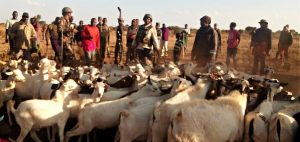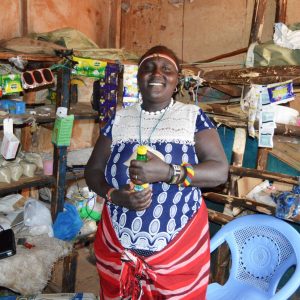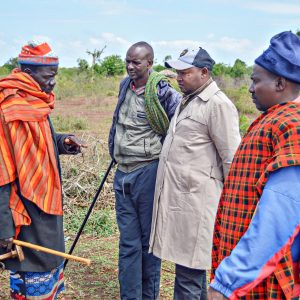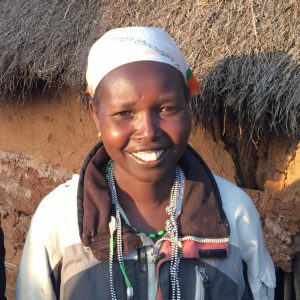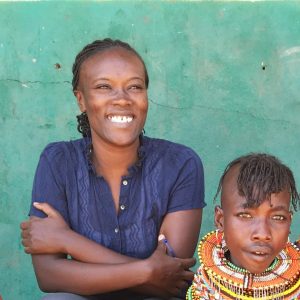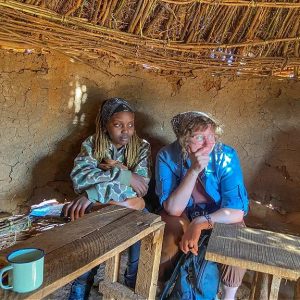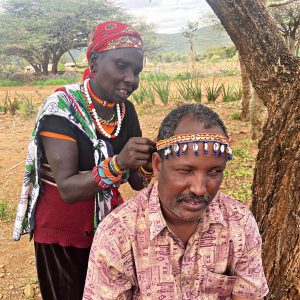ADVOCACYNET 395, May 10, 2023
Pastoralist Women Nurture Peace as Fighting Flares in Northwest Kenya
Drought and climate reignite a conflict over cows
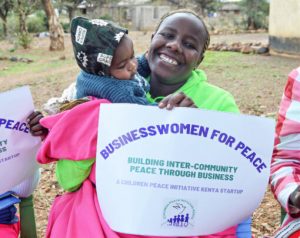
Naanyu Leserpeno, a Samburu shopkeeper, is a founding member of the network for Pokot and Samburu businesswomen
In a courageous display of community peace-building, women from the Pokot and Samburu tribes in Northwest Kenya have been collaborating through some of the worst fighting between the two tribes in years.
The ten women are members of a network for businesswomen that formed last summer to encourage trade between the communities of Longewan, on the Samburu side, and Amaya, a Pokot village.
The network has remained active in spite of the current crisis, said Monica Kinyua, a founding member of Children Peace Initiative Kenya (CPIK), an advocacy group that works with the two tribes and launched the network. Ms Kinyua spoke in a recent phone conversation from Nairobi.
Although travel has been curbed by a curfew, Ms Kinyua said that the two groups of women still contribute to a joint savings group, share news about possible raids and even return stolen goats. As she noted in a recent report to CPIK donors, this has “strengthened inter-dependency between the two communities and gone beyond the women themselves.”
The fighting in the North erupted on September 25 last year after Pokot herders stole cattle and killed eight police officers who were tracking them. Three more policemen were killed by Pokot raiders on February 11 this year, prompting the government to issue a dusk-to-dawn curfew throughout Samburu County. The curfew has been extended in some areas until May 14.
Hilary Bukuno, the founder of CPIK, described the conflict as an “absolute tragedy” that has set back years of peace efforts between the Samburu and Pokot. Reports suggest that Pokot raiders have killed scores of people in the past few weeks and are facing off against four other tribes – Samburu, Turkana, Ilchamus and Marakwet.
At the same time, Mr Bukuno said that peace was largely holding in a corridor of villages between Pokot and Samburu land where CPIK has worked, in spite of scattered acts of banditry. Mr Bukuno recently received calls from Chief Benjamin Lengapian, the chief Elder in Longewan and Pastor Nambair in Amaya, thanking CPIK and begging them to return once the curfew lifts.
“This is vindication for our model,” said Mr Bukuno. “The worst fighting is happening in places where we did not work. They don’t know each other and have no memories of being together. If we had worked there things would be different today.”
CPIK’s approach starts by bringing children from opposing tribes to peace camps and then building on the friendships formed to engage parents, elders and eventually herders, who are also known as “warriors.” Most women in the new network are enthusiastic supporters of CPIK and have sent children to CPIK peace camps.
The network business model was inspired by Josephine Lingapiani, who coordinates the Samburu group in Longewan. Ms Lingapiani buys maize from Pokot women, grinds it at her mill in Longewan, and sells the maize back to Pokot women when they visit the Longewan market.
The same goal – of building inter-dependency between tribes – is behind a second start-up to organize “cow camps” where warriors from both sides can meet during emergencies, particularly drought. Over 200 herders attended a 2-day camp last July in Amaya on the Pokot side and agreed to share pasture land that has lain fallow because of fighting.
Although the cow camps are on hold because of the curfew, CPIK views such collaboration as critical to peace because drought and climate change are driving the conflict. As Mr Bukuno and Ms Kinyua explained in a webinar last year, drought is forcing herders to encroach on the land of other tribes in search of pasture. It is also killing cows.
“Some herders have lost 99% of their animals,” said Mr Bukuno. “They traditionally replenish their stocks by raiding.”
The urgency of the threat is also underscored by a new report from World Weather Attribution which warns that drought in East Africa has killed millions of animals and will intensify as a result of human-induced climate change.
While drought has contributed to the current crisis, Mr Bukuno also blamed the economics of pastoralist herding and government policy. Herders measure their wealth and standing by the size of their herds, he said, but large herds put further pressure on water and pasture land: “They would do better by having fewer cows and making sure their animals are cared for.”
This however, is undermined by a government policy that requires all cows to be sold in Nairobi, which depresses prices and reduces the incentive to manage stocks carefully.
Meanwhile, CPIK has resumed peace camps in the neighboring Baringo County which has not been affected by the current violence, with support from The World Peace Service (WFD) in Berlin. The Advocacy Project will continue to work with CPIK on climate change and conflict.
For more on the cow camps and women’s network read the blogs of Julia Holladay, who volunteered as a Peace Fellow at CPIK in 2022 and helped to launch the two start-ups.
**

